Long Island public housing failed inspections after mold, roaches and 'life-threatening' hazards found
This is a modal window.
One after another seniors gingerly walked into the middle of an impromptu circle at their public housing complex and aired their grievances on a chilly weekday this fall.
Kathy Lai said she has black mold in the ceiling of her bathroom unit at Dogwood Terrace in Franklin Square, which is overseen by the Town of Hempstead Housing Authority. The crowd of her fellow tenants groaned in frustration.
When workers came to her unit to view her complaint of mold, she said at first they dismissed her concern.
"They finally said to me, 'We'll just paint over it,' " Lai said about the mold. The tenants gasped and chimed in with their thoughts. Lai added: "It's not out of sight, out of mind."
WHAT NEWSDAY FOUND
- Five public housing facilities on Long Island failed HUD's most recent inspection, unprecedented over the last decade.
- Federal inspection reports show issues with mold, fire safety, accessibility at the public housing facilities.
- Four of the five facilities service almost exclusively seniors living under the poverty line.
In 2022, the U.S. Department of Housing and Urban Development found half the inspected buildings at Dogwood Terrace had mold issues, including in multiple basements, the community center and in the bathrooms of several tenants' units.
The mold findings were disclosed as a part of the most recent federal housing inspection at Dogwood Terrace, which was not alone in its problems. Close to a quarter of the public housing facilities on Long Island, five of the region's 21 complexes, failed its most recent inspection. All are in Nassau County. The lone facility in Suffolk, run by the Town of Huntington Housing Authority, passed its inspection.
While the results also mean a majority of the public housing complexes' 3,000-plus units passed its most recent inspection, averaging a score of 81 out of 100, the complexes that failed mark an overall downward trend for a Long Island safety net.
A Newsday investigation reviewed over 800 pages of inspection reports obtained through the Freedom of Information Law, analyzed tens of thousands of public housing data points and spoke with more than two dozen tenants over three months to better understand the state of public housing in the region.
Meanwhile the tenants — almost exclusively seniors living far below the poverty line — are left in conditions the federal government deems in its inspection reports as "life threatening."
In the five facilities that failed its most recent evaluation, federal housing inspectors found 40 "life-threatening issues" in the sampled buildings, according to the inspection reports. The issues included an apartment's emergency exit, a window, blocked by a dresser; exposed electrical wiring in a boiler room; and expired fire extinguishers.
Four of the five facilities that failed service seniors, according to the federal data. The data show it is the first time in at least a decade these senior Long Island housing complexes have failed an inspection.
Given the multiyear lag between HUD inspecting the properties and releasing the detailed information, it is generally unclear how the properties have fared since 2022 or if additional ones have faltered. An example of a property failing two years ago and having a new inspection that's already been publicly disclosed, Great Neck Senior Citizens Housing, showed a property that failed its inspection once again. Conversely, Mill River Gardens in Oceanside failed in 2022, but a preliminary report provided by the Town of Hempstead Housing Authority showed it passed this year. HUD has not yet made the report public.
Tenants were unaware of the results of the inspections, most of which were conducted two years ago, but the scores were released this past August.
A familiar pattern emerged when Newsday spoke to tenants about their living conditions in public housing. They often would decline to speak on the record, with their full name — some citing fear of retribution for speaking about the only place they feel they can afford to live — but would then quietly disclose certain concerns.
Newsday showed tenants copies of the inspection reports, which often corroborated concerns they said they have raised for years. Tenants were surprised, and some frustrated, to have not been informed about the inspection results.
The housing projects — Great Neck Senior Citizens Housing, Rockville Manor in Rockville Centre, Mill River Gardens in Oceanside, Daly and Kennedy Heights in Glen Cove, and Dogwood Terrace in Franklin Square — also border wealthy enclaves.
Federal data show the tenants typically make just over $23,000 per year, a fraction of the average income in their respective communities. Residents often waited years to get an apartment in one of these projects, according to the federal data.
Congress has systematically underfunded the capital needs of public housing for years ... and they've knowingly done that.
—Edward G. Goetz, director of the Center for Urban and Regional Affairs, University of Minnesota
"Congress has systematically underfunded the capital needs of public housing for years ... and they've knowingly done that," said Edward G. Goetz, director of the Center for Urban and Regional Affairs at the University of Minnesota. He pointed to Congress' underfunding its own formula for funding the upkeep and capital improvements of public housing.
Goetz, whose research focuses on housing and local community development planning and policy, said that underfunding "leaves local housing authorities in a pickle, if they are really committed to offering this type of housing."
When described the conditions detailed in the federal inspection reports from Long Island public housing, Goetz offered: "That's either a housing authority that's incredibly strapped financially or one that's simply mismanaged and not doing what's needed to provide a livable environment."
A HUD spokeswoman declined to answer detailed questions on the public housing complexes that failed recent inspections on Long Island, including inquiries on any specific penalties faced. The spokeswoman provided information about the general process when a facility fails an inspection, which ranges from remedying the issues to the potential for the appointment of a receiver or taking possession of the facility.
Village of Great Neck Housing Authority Executive Director Janice Sotero said the 75-unit facility is limited to charging tenants 30% of their income for rent and the federal government's capital fund has not grown with inflation. "The housing authority is unable to renovate and has difficulty running the building," Sotero said in a statement to Newsday.
Ed Cumming, executive director of the Town of Hempstead Housing Authority, disputed the inspection findings by the federal agency.
"The housing authority strongly disagrees with the conclusions presented in the 2022 housing inspections," Cumming said in a statement to Newsday.
He pointed particularly to Mill River Gardens, which received the worst inspection score on Long Island in at least the last decade, according to public federal data. He said at the time of the inspection, the facility was in the middle of repairs with the Governor's Office of Storm Recovery, a byproduct of damage from Superstorm Sandy, a decade prior.
The score, 33 out of 100, was an "unfortunate circumstance" of HUD's "refusal to take active construction on site into consideration." Cumming said it was an "anomaly" since Mill River Gardens scored 83 in a 2024 inspection, which has not been publicly disclosed by HUD; Cumming provided a copy of the report to Newsday, which displayed a preliminary, but not a final inspection score.
At Dogwood Terrace, Cumming focused his comments on the planned redevelopment of the property, which recently faced a setback after the state declined to award tax credits.
"The housing authority is committed to building communities that everyone can be proud of," Cumming said, "and everything is done with the best interests of the residents in mind."
Rockville Centre Housing Executive Director Jamie Morrison said it resolved necessary corrections within one day. No penalties were assessed to the property.
Glen Cove Housing Authority did not respond to requests for comment about the failed inspection of one of its properties. The housing authority also did not respond to public records requests for board minutes and annual plans either, despite multiple attempts by Newsday.
‘Can't expect the moon’
"It’s definitely gone downhill as far as service goes," said Ron Leccese. a resident of Mill River Gardens, in Oceanside. The complex received the lowest score on its HUD inspection of any project on Long Island in at least the last decade. Credit: Newsday/Howard Schnapp
Mill River Gardens in Oceanside overlooks the meandering river that is its namesake. In 2012, Superstorm Sandy wreaked havoc on the property.
A decade later, costly renovations to the flooded grounds were completed, but along the way, federal housing inspectors found a number of issues with the property with 106 apartments.
Mill River Gardens received the lowest score on its HUD inspection of any project on Long Island in at least the last decade. The score, 33 out of 100, is comparable to what New York City Housing Authority properties generally receive. Outside of New York City, it is the fourth-lowest score any housing project has received in the state over the last decade. The facility, according to an inspection provided by Town of Hempstead Housing Authority, showed that it preliminarily passed an inspection in 2024.
And, comparatively, Nassau County housing projects fared slightly better in its inspections than those in Westchester County, although the 2022 inspections buck that trend.
An inspector in 2022 found problems with erosion and overgrown vegetation, tripping hazards and broken or missing hand railings at the project overseen by housing authority leadership Cumming and Karen Richards.
There were damaged doors and roofs, mold in the ceiling of common areas and electrical hazards with outlets. Multiple rooms had their only window, the de facto emergency exit, fitted with an air conditioner. A cover to the boiler room’s fuse box was missing, leaving exposed wires.
"You can’t expect the moon," resident Ron Leccese said outside his unit on a recent cool day, juggling his warm drink from Dunkin' along with his concerns. But, he added, "It’s definitely gone downhill as far as service goes."
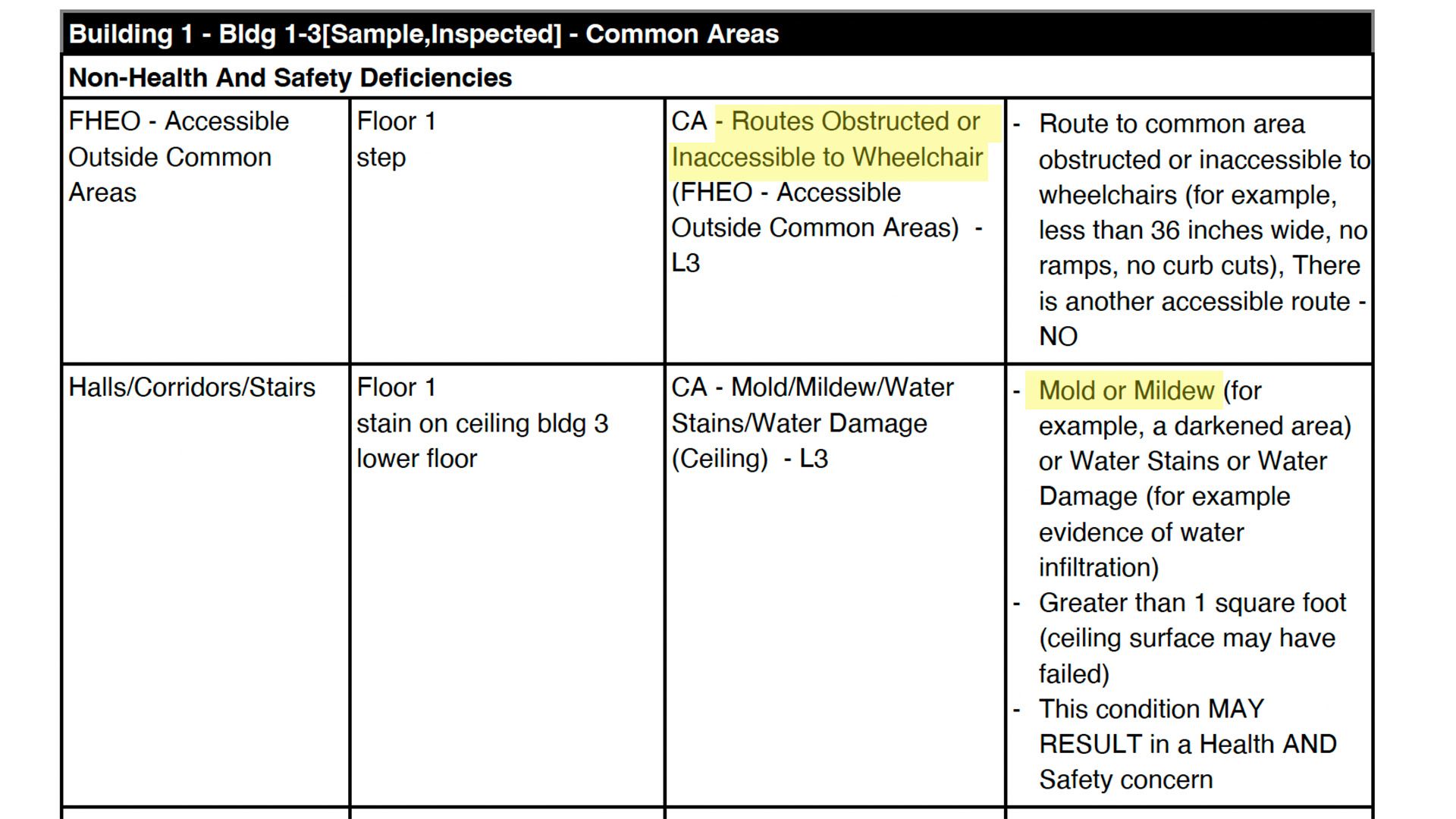
"Routes obstructed or Inaccessible to Wheelchair" and "Mold or Mildew" were among the deficiencies found during the inspection of Mill River Gardens.
Others, like Janis Ellison, had no issues.
Her apartment walls had fresh paint and were adorned with her own art, such as a reimagination of the "Mona Lisa."
"There’s always reasons for everything," Ellison said. "Personally, I have no complaints."
The Town of Hempstead Housing Authority, which manages about 1,300 apartments, is set to receive at least $7.9 million from the federal government to maintain and modernize its properties, a more than 50% increase in funding from five years ago, according to a review of HUD data on funding of public housing authorities.
While residents said they often hear the reason improvements cannot be made is because there is no budget for them, the authority has received no "shortfall" funds from the federal government to cover any potential deficit.
‘Extensive roaches’
Great Neck Senior Citizens Housing is the lone facility on Long Island to receive two consecutive failing inspection scores from HUD. Credit: Newsday/Howard Schnapp
Outside the Great Neck Senior Citizens home the elderly sit on burgundy benches under maple trees and take in the chatter of children at a nearby state-of-the-art playground.
The decaying housing project sits on the village green. The plots of two single-family homes on the block take up more land than the 75-unit senior housing complex. In nearby Kings Point, mansions are valued at more than the four-story public housing apartment building, $8.7 million, according to Nassau County property records.
Great Neck Senior Citizens is the lone housing project on Long Island to fail two consecutive HUD inspections, the most recent one in April of this year.
The Village of Great Neck Housing Authority oversees only the one property and is run by its longtime leader, Sotero. Its inspection score, on average, ranked 27th-worst in the country, according to a Newsday analysis of HUD data.
Sotero said after the 2022 inspection it had 24 hours to remedy the issues and implemented a "corrective action" plan. Then, after the following failed inspection in 2024, it is sending a "plan of corrective action" monthly to HUD. No financial penalties were assessed, she said.
In 2024, only six projects in the state, including the Marcy Houses and Gravesend projects in Brooklyn, scored below Great Neck. The Great Neck property has had a long-standing issue with its boiler system. The village, a separate government entity from the housing authority, sent a notice of violation for a lack of hot water for the elderly in June 2022, according to housing authority board minutes.
HUD inspectors found nonfunctional smoke detectors and carbon monoxide alarms in nearly half the 19 sampled units, as well as mold in ceilings and roaches in the compactor room and apartments. Sotero said residents take out smoke detector batteries or remove them and carbon monoxide alarms have been installed.
By 2024, some of the same issues were found again. One apartment had a glue insect trap above both the bathroom sink and the toilet. "Extensive roaches" were stuck to it, according to the HUD inspection report.
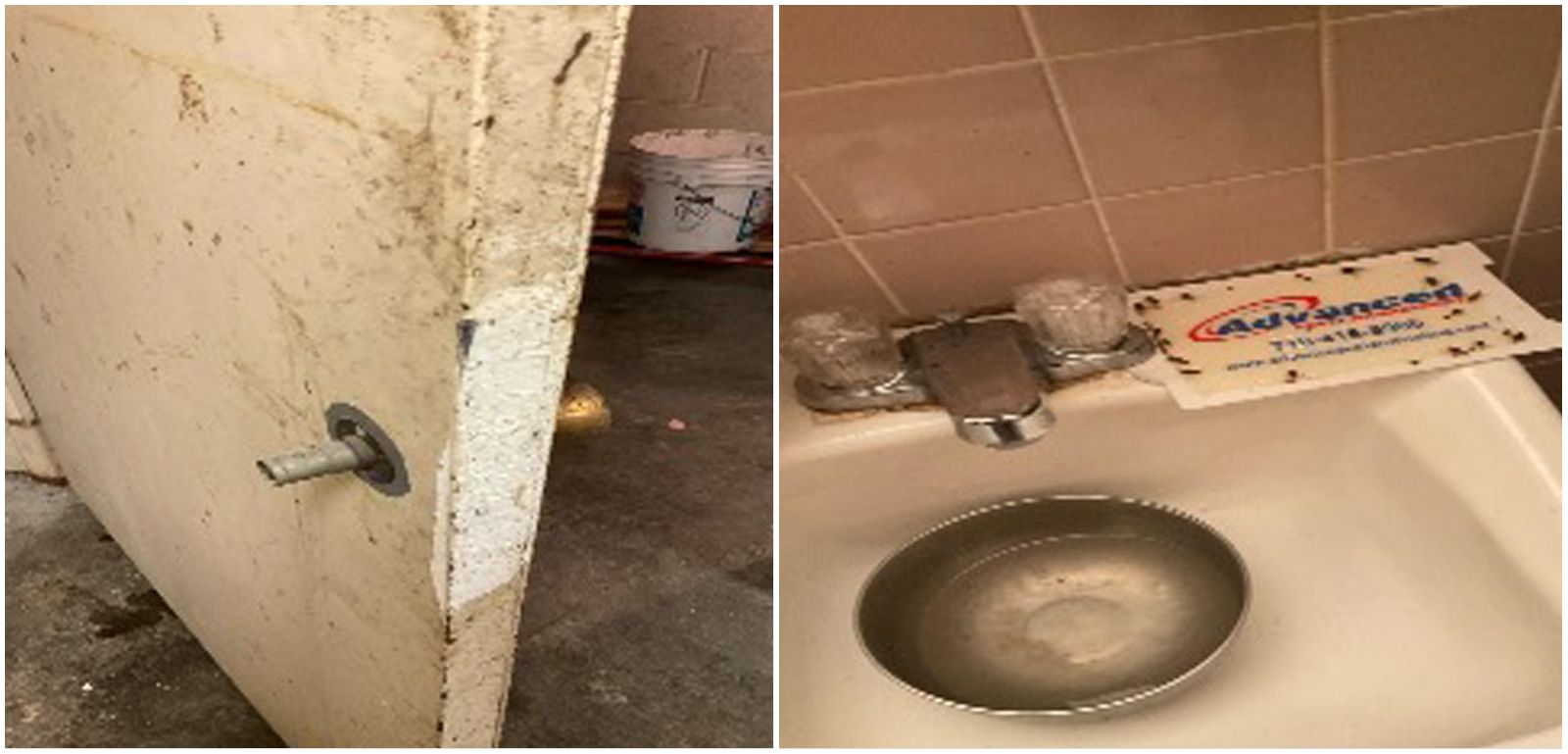
"Fire labeled door does not close ... to compactor room has missing hardware" and "extensive cockroach infestation" were among the "severe" findings in the latest inspection report for Great Neck Senior Housing.
In the compactor room and the community room, a smoke detector was missing. Kitchen and bathroom exhaust fans were covered in duct tape. One unit had "high levels" of mold in the bathroom ceiling, the report said.
Around the grounds, trash can be spotted among the overgrown hedges. Out front, a Sept. 11 memorial is covered in weeds and its flagpole is bare.
Several residents at the senior housing declined to speak on the record. They cited fear they could face eviction or unspecific retaliation from management. They have been told for years that the building will be renovated, according to residents along with public records of minutes and annual plans obtained by Newsday.
"The tenants are walking on a knife's edge," said Ian Wilder, executive director of Long Island Housing Services, which advocates for fair affordable housing and against unlawful housing discrimination. "It’s not in their interest to make their landlords aware that they’re publicly complaining. Why would you gamble in a place that it’s very hard to find housing?"
The waiting list is about 100 people and typically takes 10 years for individuals to secure a unit at facility, Sotero said. The waiting list has been closed since 2019, she said.
HUD doesn't keep track of waiting lists for public housing authorities, an agency spokeswoman said.
The housing authority is set to receive $530,000 from the federal government for operation and improvement this year, double the amount it received five years earlier, according to federal housing data.
‘Up to par’
Rockville Manor in Rockville Centre was one of five Long Island facilities to fail an inspection in 2022. Credit: Newsday/Drew Singh
Residents at Rockville Centre Housing Authority’s 50-apartment senior resident facility had relatively few frustrations with their Merrick Road home, which is scheduled for state-subsidized renovations.
"Everything is safe and kept up to par," resident Bill Lewis said from a bench outside. Inside, tenants expressed satisfaction with their living quarters.
An inspector in 2022 found nearly half the units with smoke detector problems and a few with inoperable carbon monoxide alarms. The inspection report shows that the housing authority was unable to provide any non-expired certificates for any of the systems it checks on: boilers, elevators, fire alarms, lead-based paint and sprinkler systems.
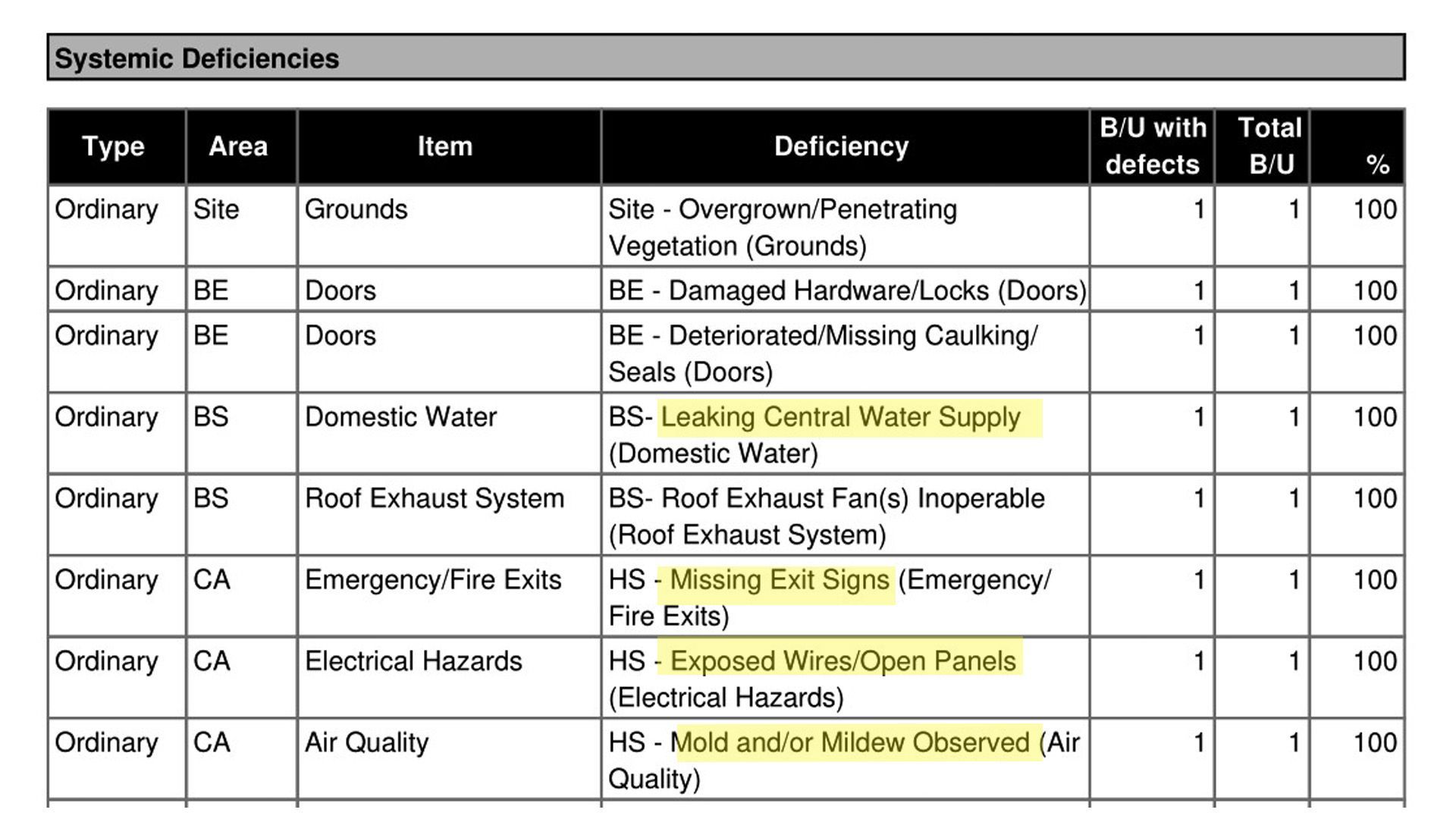
"Leaking Central Water Supply ... Missing Exit Signs. ... Exposed Wires/Open Panels" and "Mold and/or Mildew Observed" were among the findings in the latest inspection report for Rockville Manor.
The exhaust system on the roof was damaged beyond the point of working. There was a leak in the central water supply, found in the basement of the superintendent’s storage area. Mold in a stairwell that may result in a health and safety concern. A fire door in the laundry room would not properly latch, an inspection found.
Another failing score
Daly and Kennedy Heights in Glen Cove has failed three of its last four inspections. Credit: Newsday/Drew Singh
The lone housing project to fail its most recent inspection to not specialize in senior housing is Daly and Kennedy Heights, run by Glen Cove Housing Authority Executive Director Eric Wingate and home to 212 apartments. It’s now failed three of its last four inspections.
On a recent day, residents lined up at a food bank on-site. A newly paved basketball court stood in contrast to the finding of a 2022 inspection noting that up to half the play area was damaged.
As tenants walked back with armfuls of fresh produce, they navigated ongoing construction of a wall at the base of the hill where pine trees provide shade. Two years earlier, a HUD inspector found significant issues with erosion, raising concerns about the retaining walls.
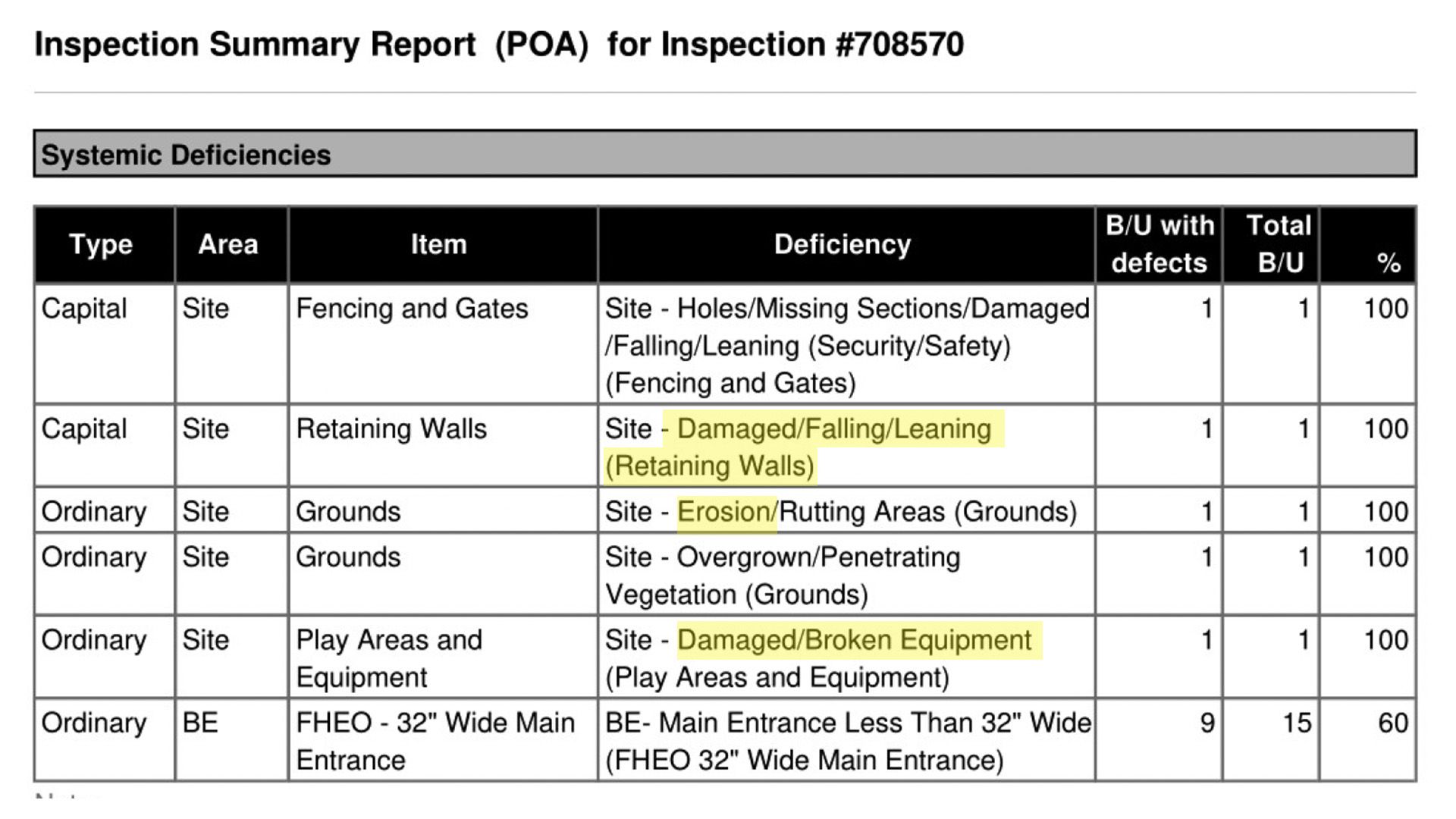
"Damaged/Falling/Leaning (Retaining Walls" and "Erosion" were among the findings in the latest inspection report for Daly and Kennedy Heights along with "Damaged/Broken Equipment" in play areas.
Inside the apartments, HUD found, according to its most recent publicly available inspection: damaged sprinkler heads, mold in units, broken handrails in the stairwells and one bedroom with evidence of mice or vermin.
‘I have to live’
Kathy Lai in her apartment at Dogwood Terrace in Franklin Square, run by the Town of Hempstead Housing Authority. It is one of five facilities on Long Island that failed its most recent federal inspection. Credit: Newsday/Alejandra Villa Loarca
John Heaphy, a resident leader at Dogwood Terrace, is quick to show anyone the cracks in his second-floor apartment ceiling, which he said is a sign the 1971 building is sinking.
"We just want answers," Heaphy said. "We are human beings that live here. Human beings. And we want to be treated that way."
Cracks in the building have been present at least since the HUD inspector evaluated the grounds, measuring one at greater than an eighth of an inch wide and 11 inches long.
A sidewalk had an "abrupt change in elevation" that "poses a tripping risk," according to an inspection report. Multiple residents pointed to various places where they said they had tripped and hurt themselves.
In the community center, a coat closet had enough mold where the "ceiling surface may have failed." A possible failing wall and ceiling were found in a basement, too, an inspection report said.
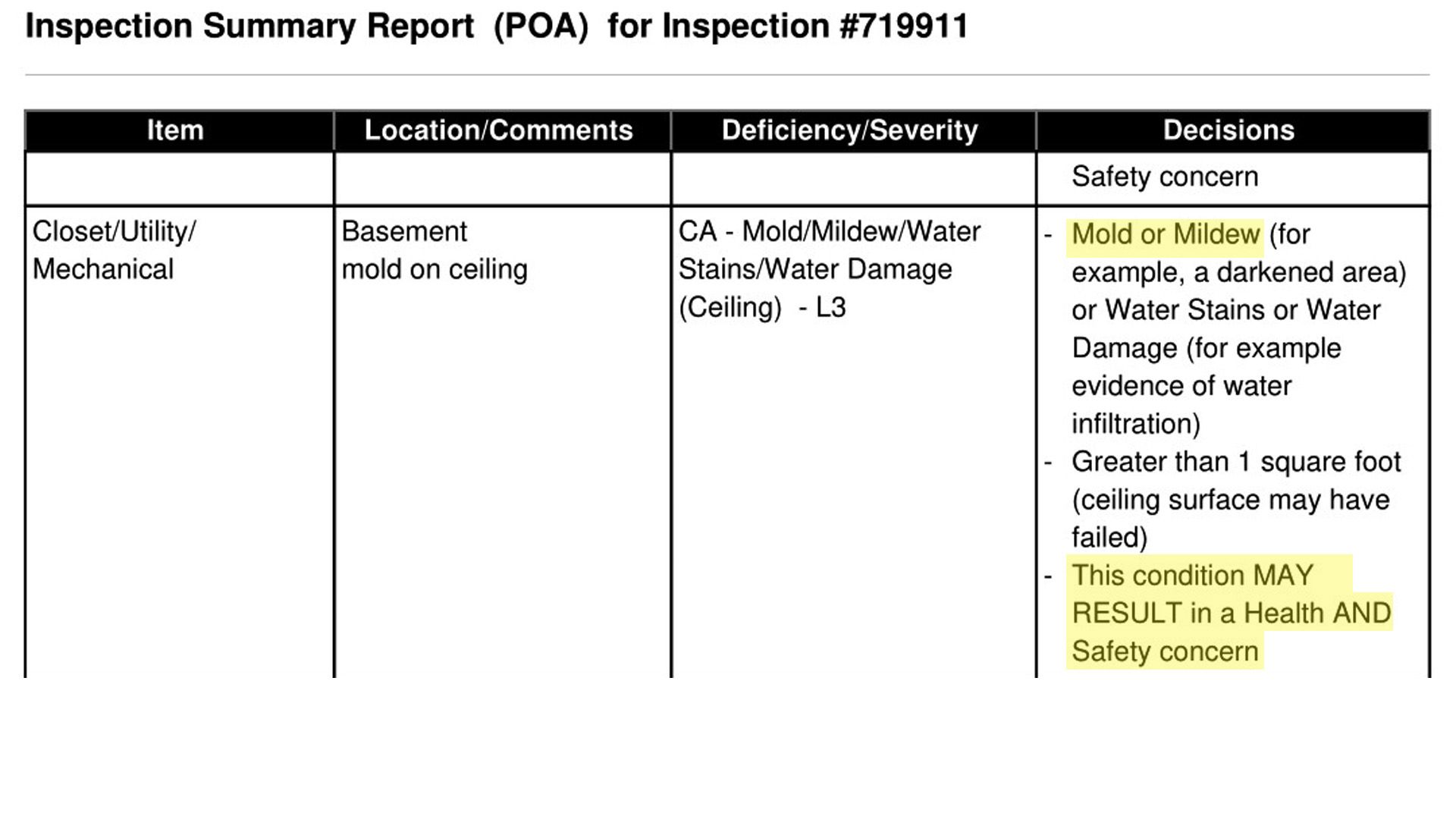
"Mold or Mildew" that "MAY RESULT in a Health AND SAFETY concern" were among the findings in the latest inspection report for Dogwood Terrace.
Mold issues described in the inspection report remains a significant concern, residents said.
Kathy Lai, a resident of six years, in October showed reporters the mold she had described to her fellow tenants.
In her stuffy apartment, brightened with family photos on the walls, a sign over the kitchen table reads, "Nana, you are the piece that holds us together. We love you."
Lai said once she was told after raising a concern to the housing authority, "Well, you’re moving anyway," a reference to the planned demolition of the building and two-year relocation of residents while a new building is erected.
"I said, ‘But I have to live,’" Lai said. She noted her chronic obstructive pulmonary disease, which medical experts believe can be exacerbated by prolonged exposure to mold. "I said, ‘I have COPD — it’s bad and that’s going to kill me.’ "
With Arielle Martinez
This is a modal window.
Nassau Juneteenth celebrations ... BTS: Everybody Loves Raymond ... What's up on LI ... Get the latest news and more great videos at NewsdayTV
This is a modal window.
Nassau Juneteenth celebrations ... BTS: Everybody Loves Raymond ... What's up on LI ... Get the latest news and more great videos at NewsdayTV
Most Popular

















